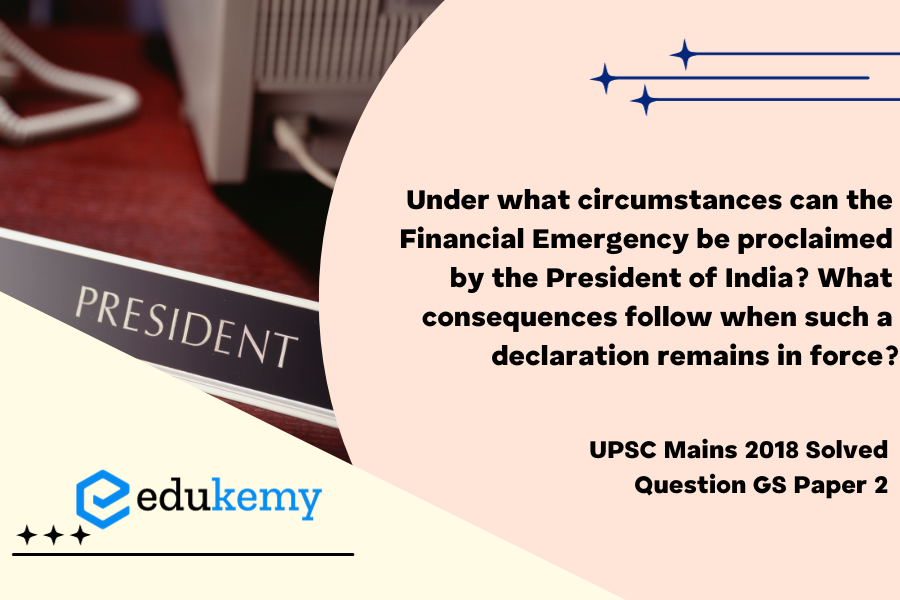The proclamation of a Financial Emergency in India, as stipulated in Article 360 of the Constitution, is a formidable step that empowers the President to tackle a severe financial crisis that threatens the stability of the country. The President can declare a Financial Emergency when he is satisfied that the financial stability or credit of India, or any part thereof, is in jeopardy. This decision is not taken lightly, and certain conditions must be met, such as the threat to the financial stability of the country or a state due to factors like war, external aggression, or a grave economic crisis. Once declared, the consequences are far-reaching. The President gains the authority to issue directions to states to observe financial discipline, and the executive and legislative powers of the states are subordinated to the Centre’s directives. This centralized control, though necessary in times of crisis, underscores the gravity of the situation and the imperative for a swift resolution.
Tag: Indian Constitution—historical underpinnings, evolution, features, amendments, significant provisions, and basic structure.
Contents
Decoding the Question:
- In the Introduction, try to briefly write about the Emergency Provisions and Financial Emergency.
- In Body,
- First, discuss the grounds for the declaration of Financial Emergency.
- Second, discuss the consequences of the Proclamation of a Financial Emergency.
- In Conclusion, try to mention the overall impact of the Financial emergency.
Answer:
The rationality behind the incorporation of Emergency provisions in the Constitution is to safeguard the sovereignty, unity, integrity and security of the country, the democratic political system, and the Constitution. During an Emergency, the central government becomes all-powerful and the states go into total control of the Centre. Article 360 empowers the President to proclaim a Financial Emergency to provide a safeguard for the Central Government from financial threats and stability of India.
Grounds of Declaration of Financial Emergency:
- The President of India proclaims the Financial Emergency under Article 360 of the Constitution when he is satisfied that the financial stability or credit of India or of any part of the territory thereof is threatened.
- The 38th Amendment Act of 1975 made the satisfaction of the president in declaring a Financial Emergency final and conclusive and not questionable in any court on any ground. But, this provision was subsequently deleted by the 44th Amendment Act of 1978 implying that the satisfaction of the president is not beyond judicial review.

The consequences of the proclamation of a Financial Emergency are as follows:
- The executive authority of the Centre extends to directing any state to observe such canons of financial propriety as are specified by it; and the President may issue directions, necessary and adequate for the purpose.
- Any such direction may include a provision requiring the reduction of salaries and allowances of all or any class of persons serving in the state; and the reservation of all money bills or other financial bills for the consideration of the President after they are passed by the state legislature.
- The President may issue directions for the reduction of salaries and allowances of all or any class of persons serving the Union; and the judges of the Supreme Court and the High Courts.
- Once approved it continues indefinitely without repeated legislative approvals. The President can revoke this proclamation anytime. This doesn’t require parliamentary approval.
In India till now, the financial emergency has not been invoked; during an emergency, the Centre acquires full control over the states in financial matters. H N Kunzru who was a member of the Constituent Assembly stated that the financial emergency provisions pose a serious threat to the financial autonomy of the states. Thus, it should only be provoked in an extraordinary circumstance, with proper checks and balances.
In case you still have your doubts, contact us on 9811333901.
For UPSC Prelims Resources, Click here
For Daily Updates and Study Material:
Join our Telegram Channel – Edukemy for IAS
- 1. Learn through Videos – here
- 2. Be Exam Ready by Practicing Daily MCQs – here
- 3. Daily Newsletter – Get all your Current Affairs Covered – here
- 4. Mains Answer Writing Practice – here


